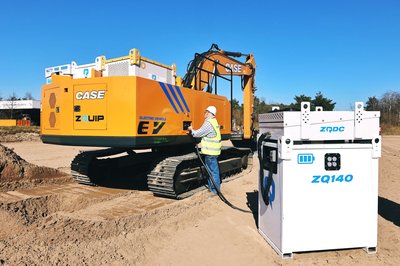Electrification is steadily transforming the way the world works. Take power tools — where for years swappable batteries have provided tradespeople and DIYers alike unparalleled mobility. But what if the construction industry could experience the same flexibility and efficiency that’s revolutionized the hand tool space?
Enter ZQuip, a modular system that makes converting construction machinery to clean energy easier than ever.
Just as a carpenter effortlessly swaps batteries between drills, drivers, and saws on the workbench, ZQuip is bringing that same convenience to the construction site. The company, born out of Moog Inc. — a designer and manufacturer of precision motion and fluid control systems for aerospace, defense and other industries — is revolutionizing heavy machinery with its swappable battery technology. ZQuip is promising a future where the rumble of diesel is replaced by the sustainability and quiet efficiency of electric energy, without sacrificing power.
‘Electric is Here’
A project five years in the making, ZQuip is now spinning out of Moog as it gears up for growth and scales its modular, adaptable, and connected electrified solution to the construction industry. Moog is partnering with TechNexus Venture Collaborative on ZQuip’s spinout, relying on TechNexus’s experience scaling industrial and mobility ventures.
ZQuip, which debuted commercially at Bauma 2025, the premier global trade fair for construction machinery, is already delivering operational systems to customers. It works with construction giants like Case, which utilizes ZQuip’s technology in its electrified tracked and wheeled excavators.
“Electric is here,” said Chris LaFleur, CEO of ZQuip. “The demand is there … Customers see that our solution is real and that it works. Now it's about implementation and scaling.”
A misconception of electrified construction equipment is a loss in power compared to traditional diesel machines. ZQuip’s solution actually offers better performance, LaFleur said, and results in overall less wear and tear on the machine — in addition to being more cost effective and environmentally friendly compared to diesel.
“They're so much more powerful. Have you ever seen a Tesla fly by you? It's the same thing on a construction site,” LaFleur said. “An electric motor is a better experience for the machine. It's quieter, it's cleaner, it has less vibration. The torque and power is better.”
The ZQuip Difference
ZQuip partners with OEMs and integrators to design custom electric retrofit kits. The kits are easily installed, converting machines into clean-energy, ZQuip-ready solutions. On site, ZQuip’s battery modules work like traditional batteries, and its software optimizes energy use, maximizes uptime, and enables fleet-wide electrification.
ZQuip's system allows for battery switches in just minutes, effectively providing unlimited runtime, a stark contrast to the long charging times required by many other electric solutions today.
With ZQuip’s modular solution, a construction site’s machines can be both all electric or hybrid, with its hybrid module acting as a range extender. ZQuip provides flexibility based on application, to use diesel if needed, hybrid systems, hydrogen fuel cells, and a variety of battery types.
ZQuip is initially targeting the European and North American markets. In Europe, the company has seen especially high demand as the region increasingly shifts to electrified solutions.
Born From an Industrial Leader, Ready for Venture Scale
Despite the benefits of electrification, the construction industry has lagged behind others, such as automotive and trucking, in the widespread adoption of electrification and alternative fuels. At Volvo, a global leader in construction equipment sales, just over 2,000 of its 56,000 construction equipment sales in 2024 were electric, accounting for just around 3.5%.
ZQuip believes it is well positioned to capture market share as the industry turns to clean, electric solutions to power their construction fleets. And beyond retrofitted machines, LaFleur said ZQuip’s next phase will be working with OEMs to build electric equipment right off their own production line — built off the ZQuip platform.
And being born from the engineering prowess of Moog, ZQuip inherits a legacy of reliability and high-performance technology. This foundational expertise provides ZQuip with a significant advantage as it enters the construction electrification market, offering customers a level of trust and capability often absent in nascent startups.
“Our vision is to allow the industry to accelerate faster and grow and just work,” LaFleur said. “And we want ZQuip to be that seal of approval. If it's ZQuip, you know that this system is going to work.”
